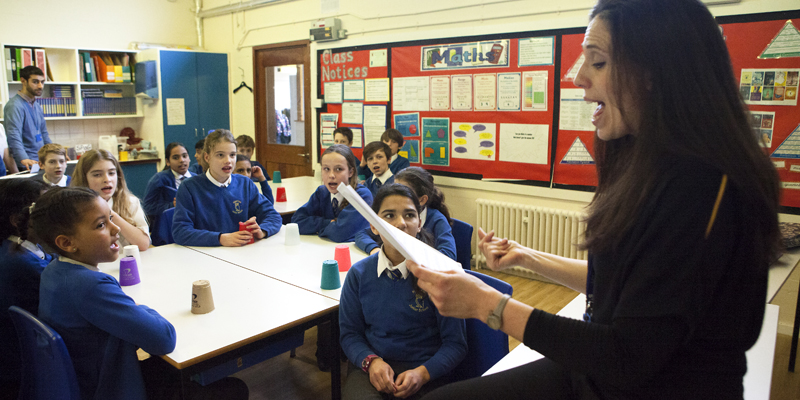Now, more than ever before, young people are highly prone to experiencing a mental health disorder, a statement that was confirmed by a recent NHS digital report into the mental health of young people in the UK. Katharine Sadler, Director at the National Centre for Social Research and contributor to the report, has also commented on the prevalence of mental health challenges in youth, describing the statistics as “significant.”
Jon Tait is an experienced senior leader and current deputy headteacher working in a large and diverse secondary school in Middlesbrough. As a classroom teacher, he has experience of working in 3 different North East schools for over 15 years. He's also an author, speaker, coach, and consultant, with an impressive list of contributions to the education sector. Joining us as a keynote speaker for Lead LIVE Darlington, we caught up with Jon to discuss his work and new book, "Bloomsbury CPD Library: Senior Leadership".
Taking on an ‘acting’ role can be a great way to try out a new role with the safety of knowing it is for a finite amount of time. If you are thinking about moving into leadership, then it can be a perfect way to dip your toe.
The thing about acting positions is that their timing is rarely predictable. In my career, I have acted up twice and gone on secondment twice. The first time, my phase leader damaged her knee and was unable to walk for a term. The most recent time, my head gained a much-deserved role as an SIP (school improvement partner) in a neighbouring county. I was tasked by the governors to take the helm while an experienced replacement could be found.
The main differences between a secondment and acting up are that with a secondment you are able to choose whether to apply. It will be in a different school and usually takes the form of a fixed term contract. With acting up, you may not have a choice! If you are in school leadership and your line manager is absent for any reason, then tag - you’re it!
It’s June 2018, and we’re due a teaching and learning observation week. Gauging the temperature in the staff room, after a hectic year, I felt that another round of observations from senior and middle leaders would have finished our teachers off! I wanted to boost morale, to create a feelgood factor in our last month. I wanted to encourage all to take risks in the classroom, to observe one-another, and come away with something tangible to use in our lessons the next day. This is how the BDB Dollar Challenge came about here at Bishop David Brown School.
Thank you Brooke & Olivia for explaining the Dollar Challenge @BDBSchool ... pic.twitter.com/N6fo4iUGtw
— Tim Smith (@TimSmithCEO) June 21, 2018
Staff needed to feel empowered. In discussions with Darren Gould, my deputy head of school, we developed the notion of a low-threat, rewards-based system: Staff highlight an area they want to showcase, develop resources, plan the lesson and advertise their activities. In a staff briefing, everyone was given the opportunity to sign up to attend each other’s lesson. If cover was required, a member of SLT would cover for them.
The week arrived and we all visited one-anothers’ lessons, armed with our BDB dollars (pictured top). It was up to each individual to determine how many dollars they would pay in response to the lesson they had seen. Staff observed the delivery, looked at resources, and questioned students about the activity. The impact was palpable across the school, with 75% of students questioned highlighting that they felt lessons were more engaging. Additionally, many students responded to a survey stating they enjoyed the fact that other classroom teachers were showing an interest in their lessons.
#BDBDollarChallenge underway... active and collaborative learning with yr8s. Post it’s, info gathering, independent practical work with differentiated support, it’s all go today! @BDBSchool #ProudOfBDB pic.twitter.com/EXIHbvE8J2
— BDB Science (@BDB_Science) June 21, 2018
“The Dollar Challenge helped me to focus on and showcase the strengths of my teaching. For me, it was an opportunity to display elements that I believe are fundamental to the foundations of 'outstanding' teaching, and share that vision with my colleagues. As a viewer of others, I saw it as a chance to witness lessons that are completely different to English, like Food Tech, and 'steal' ideas from the more practical subjects. I'm actually looking forward to doing it again!” - Jamie Foster, head of English
The dollar challenge continues.Year 9 are very focussed. #ProudOfBDB @BDBSchool @InnovateMySchl pic.twitter.com/co2GURU76e
— James Rodgers (@jamesdrodgers1) June 22, 2018
When we reflected on the week we knew we had made the right decision to change our practice. The whole school was really feeling the effect of a busy year, and that was not my aim in September. The Dollar Challenge created a buzz in the staff room, one which carried us right through to the end of term and made everyone excited for what was ahead. I was proud and hugely impressed by the level of creativity displayed, and the feedback from students and staff alike was great.
The dollar challenge is hotting up. Standing room only in Mr Foster and Mr Longs classrooms. #ProudOfBDB @BDBSchool @InnovateMySchl @welovewoking pic.twitter.com/OGdD8vipvT
— James Rodgers (@jamesdrodgers1) June 25, 2018
So what have we learnt? The key lesson, for 2018/19 and beyond, is that we need to do more to empower staff to visit each other’s lessons, encourage them to take risks, and give them the confidence to know that if it fails, no judgments will be made.
Want to receive cutting-edge insights from leading educators each week? Sign up to our Community Update and be part of the action!
Take a moment to think about an ideal school environment.
You might imagine a calm, well-operating and friendly, happy school, where:

Embedding regular singing into school life is a way of ensuring that these attributes develop over time. At Sing Up we have seen countless examples and collected many case studies where the school community themselves believe that singing that has transformed their school.
Looking at it the other way around, it is uncommon to find schools where these ‘ideal’ factors are present and where there is no school commitment to singing, music or another art-form.
A singing school is a place not just where singing happens regularly, but where singing is right in the middle of school life rather than on the periphery. It is a school where singing is an everyday activity for all children. It is a place where the whole school community knows and can describe the imact singing has in their school.
But changing or developing a school’s culture first requires a change in beliefs and attitudes. Then a renewed focus on music can begin.

For children and their parents
Children and young people are typically more inclined to engage with an activity they enjoy and can see a purpose to – they want to know, what’s the point? So, to truly engage children we could help them further to see the lasting value of pursuing singing and music.
Chorus America’s Choral Impact Study documented the connection between choral singing participation and children’s attainment in the classroom. The study found that children who sing in a choir tend to get significantly better grades than their classmates who don’t take part in choir. A real driver for children of today, who are under high levels of pressure to achieve, could be the fact that taking part in music can have a lasting positive impact on their success in life, whichever career path they wish to follow.
If children understand the continued value of participation in singing and have access to quality provision they’ll quickly become your best advocates for music.

For teachers and school leaders
There is frequently a lot of impassioned discussion about whether the reasons for encouraging and supporting children to sing regularly are fundamentally intrinsic or extrinsic. I would argue that they are both, and that the extrinsic and intrinsic benefits are deeply connected to one another.
Extrinsic benefits might include things like:
While intrinsic benefits might include:
The creative arts – music in particular — are known to have a powerful positive impact on a school environment and on learning outcomes for pupils. And of the musical activities that you can embed in your school most readily and inexpensively, singing is the most accessible of all, and the most adaptable and versatile. Becoming a singing school motivates the school community to work together towards a common goal while taking part in an activity that everyone can do and enjoy.
The quality of the artistic output itself of course cannot and should not be completely disregarded. But as children and young people have a varied natural ability; diverse cultural references and backgrounds; and relative privilege or deprivation, it can be unhelpful to set firm benchmarks of the level they should be able to achieve in their singing or music-making.
What is important is the journey. That you begin in one place, able to do certain things, and then progress to a point where you can do those things better and learn to tackle new challenges with enjoyment and a sense of achievement, rather than anxiety and pressure.
Members of school staff can’t be left out of the picture either. Pretty much all of the best singing schools have some sort of staff singing. The benefits of singing with your co-workers are enormous; it helps you bond, boosts your confidence as a vocal leader, and helps to give all staff the confidence to sing in the classroom.

For all of us – singing is for life!
Singing regularly in a group is beneficial at all stages of your life. Possibly the best evidence for this is that successful people from all industries take time out of their busy days to sing as part of an amateur choir. They’ll spend hours every week rehearsing and will even use precious annual leave time for concert days.
I was fortunate to sing with a wonderful school choir in my teenage years which, clearly, has had a major impact on my career and life-choices! Singing is both a fantastic escape and requires intense focus, which can ease away any stresses from the working day. Mobile technologies and an always-on mentality mean that it’s all too easy to end up working through your evenings, and to not take time out; a choir gives you a ready-made community to spend time with. The bond of singers in a choir is an extraordinary one and friendships made within a choir can be a gift for networking.
Let’s give children opportunities to sing regularly from early years onwards – then not only are we potentially preparing musicians and singers for the future, we are giving them a source of enjoyment, connections, health, and wellbeing for life.
Want to receive cutting-edge insights from leading educators each week? Sign up to our Community Update and be part of the action!
As I’ve only just dipped my toe into school leadership, I was surprised at just how difficult it has been this year. Simply managing your class, or leading a subject, is a full time, stressful job all year round. Throw the demands of leading a core subject - or the day-to-day demands of managing a school - into the mix, and ‘stressful’ doesn’t describe it. Thankfully, there’s a great, highly-accessible resource to hand: music.
How exactly can music can inspire leaders? To find out, we first need to discuss how it can make a difficult job easier. I am a musician and play a number of instruments. Playing an instrument, even when you have lots of experience, requires your full and complete concentration. Playing the piano, as I do, requires you to engage so many different elements of your body, both physical and mental that any other thought goes quickly out of the window.
That sheer level of concentration is how I destress. The only place where thoughts of school go fully out of my mind is sat at a piano stool. Any school leader, or teacher for that matter, needs something that completely frees their mind of school - be it exercise, meditation, and so on. This is definitely a vocation rather than a job; you simply can’t walk away at 3.30. However - and this is vital - you MUST be able to compartmentalise in order to survive.
The other way that music helps me with wellbeing is singing. I sing in a community choir once a week. Whilst the levels of concentration are different, this is another oasis in a busy week, one which frees my mind from thoughts of school. Music, and singing in particular, has so many physical and mental benefits.

A review by Chanda and Levitin (2013) highlighted the positive impact of simply listening to music in a variety of ways. The review showed that listening to music releases dopamine and oxytocin in the brain, whilst also increasing the body’s immunity by supporting the production of immunoglobulin A, an antibody that works through the mucous system. One of the studies reviewed also found that listening to music resulted in a decrease in cortisol, the ‘stress’ hormone.
Singing has also been found to have major physical impacts upon the body, particularly the respiratory system (Vickhoff, 2013). Singing, especially in a group, produces a coupling of heart rate variability to respiration, a process called respiratory sinus arrhythmia (RSA). Singing produces slow, regular and deep respiration, which in turn triggers RSA. RSA is a benefit of activities such as yoga and tai chi, so singing can be seen as an alternative to these, as well as having other physical and emotional benefits.
So music is good for you. Listening to music and singing along, whether in an organised way with a choir or simply in the shower, or in the car, on the way to work, can have a positive impact on your body - both mentally and physically. Music can provide a moment of calm in a busy, stressful day. It can help to clear your mind, allowing you to de-stress.
So where does the school leader inspiration come in? Well, if all the things above work, then you are better able to do your job. If your whole outlook has changed, if you are calmer and your body is tuned and able to function, then you will do your job better. I could write a whole article on how music inspires me and others, but first we need bodies and minds that are healthy and able to work. Listen to music, sing along (well or otherwise) and arrive at work with an opportunity to have a positive impact on the children in your care. This year, the doctor subscribes a burst of ABBA, Queen or Ed Sheeran on your journey into work (possibly not on public transport...).
Want to receive cutting-edge insights from leading educators each week? Sign up to our Community Update and be part of the action!

A community-driven platform for showcasing the latest innovations and voices in schools
Pioneer House
North Road
Ellesmere Port
CH65 1AD
United Kingdom